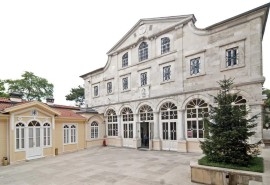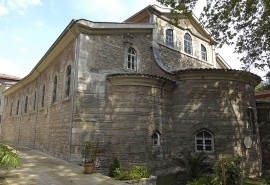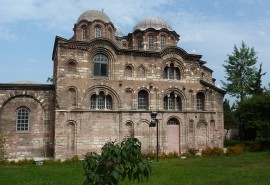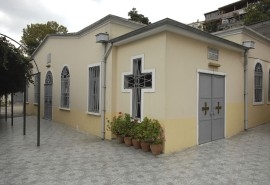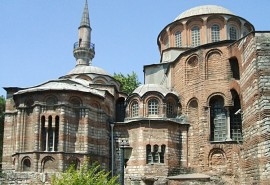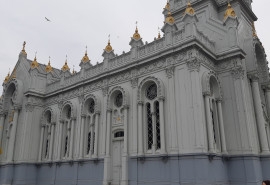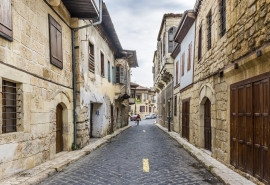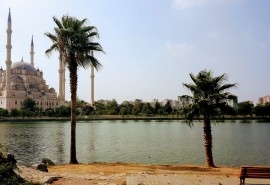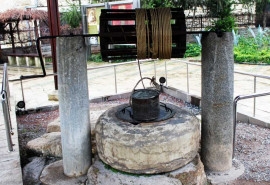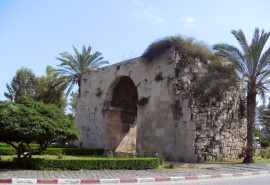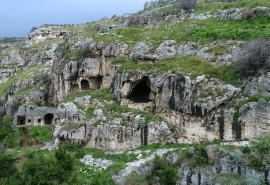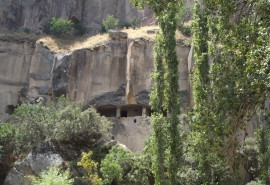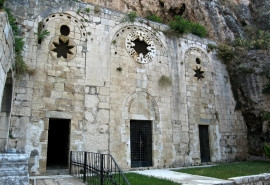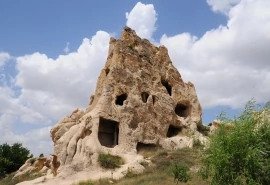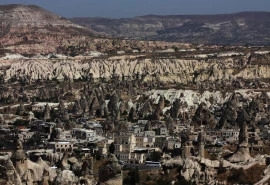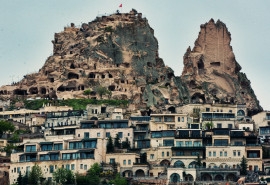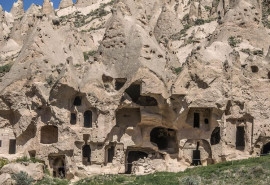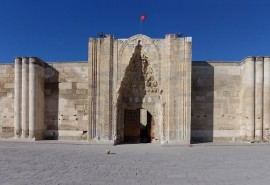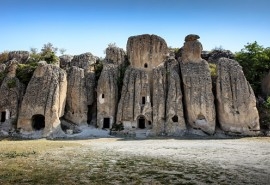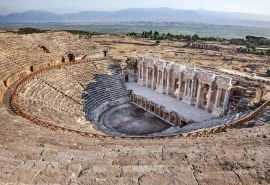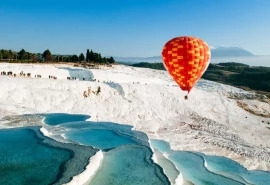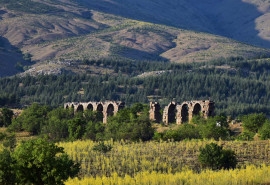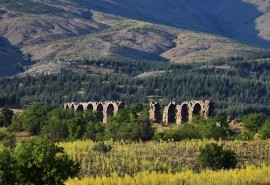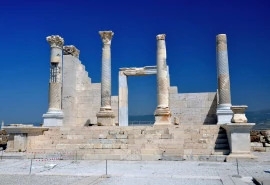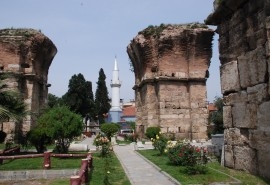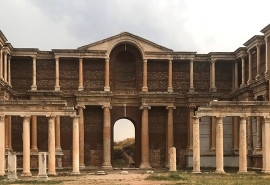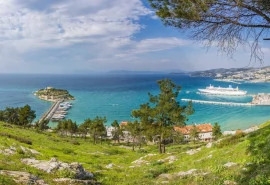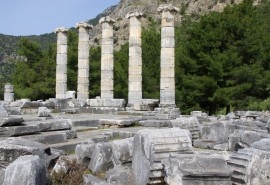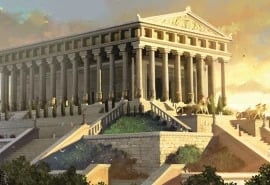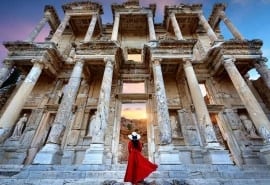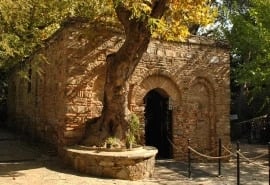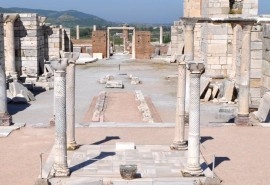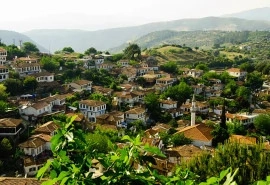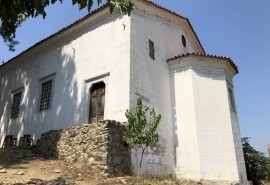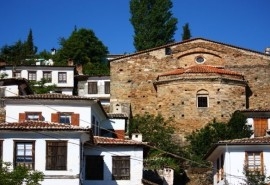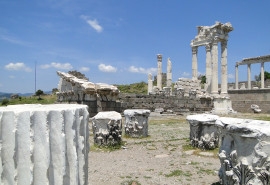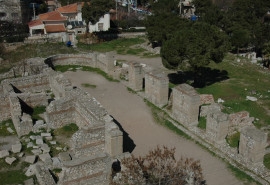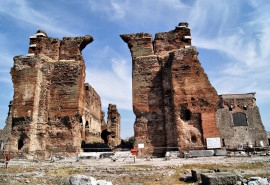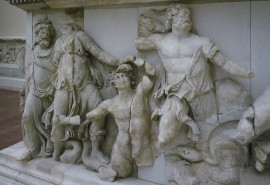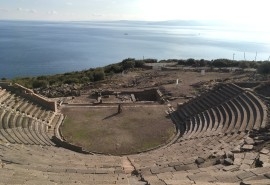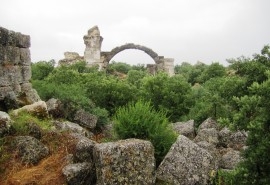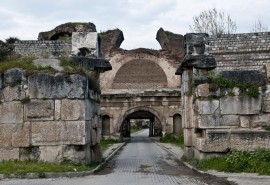14 Days Biblical Tour in Turkey
-high.jpg&w=2048&q=100)
-high.jpg&w=828&q=100)
-high.jpg&w=828&q=100)
-high.jpg&w=828&q=100)
Duration
14 days
Max Group Size
40
Departure Type
Scheduled
Guiding Method
Fully guided
Physical level
easy
Operated In
English
Age Requirement
11 - 90 Ages
Tour Overview
In this 14 day biblical tour, you will follow the footsteps of St. Paul in Turkey and the Seven Churches in Asia Minor. The tour package includes the foremost religious sites and places. This pilgrimage tour package is recommended for all Christians and believers.
Attractions
Highlights
Itinerary
Welcome to Turkey (Istanbul Airport). You will be transferred to your hotel, where you will check in with the TSG team. The rest of the day is yours to explore Istanbul. Overnight in Istanbul.
TSG advises: A half-day Dolmabahce Palace Tour can be an inspiring alternative for those who do not want to wait until tomorrow to explore the city, the Whirling Dervish Show, or the Rythm Dance Show might be better for the night.
(Breakfast included)
The tour will start after breakfast. Today you will visit one of the most special churches in Istanbul. Like the old city destinations, these churches are worth seeing. We will visit the Patriarchate at Fener, which dates back to the early days of Christianity and is an architectural masterpiece that blends Byzantine, Ottoman, and Neoclassical styles. One of the oldest and most important Greek Orthodox churches in Istanbul, Aya Yorgi Greek Orthodox Church, is our next destination. The patriarchal throne, the most priceless object in the building, has endured multiple fires and survived. It is believed that the throne dates back to the 5th century.
The Church of St. Mary Pammacaristos, considered one of Istanbul's finest examples of Byzantine art, will be our next stop. The interior decoration is a mixture of Byzantine and Ottoman features, and its beauty will enchant you. The Bulgarian St. Stephen Church, on the other hand, is one of the few cast-iron construction churches around the world. It was recently restored and made accessible to the public.
The Church of Panagia of Blachernae is one of the Unesco World Heritage Sites and is the home of magnificent 14th century mosaics and frescoes, which we will visit before our last stop at St. Savior in Chora. In St. Savior in Chora, you will be impressed with the masterpieces of Byzantine art. Overnight in Istanbul.
Please Note that due to restoration, St. Savior's in Chora could be temporarily closed. The other destinations are open for visits during the day, and Sunday rites are held regularly.
(Breakfast included)
We will fly to Adana early in the morning. Adana is situated on the Seyhan River and has a long history that dates back to the Hittite period. Throughout its history, the city has been an important center for trade, agriculture, and industry. After arrival, we will visit the Tarsus region, which is home to several historical and religious treasures.
We will visit Paul's Well first. Apostle Paul's Well is a historical site located in Tarsus, and according to local tradition, the well is named after the apostle Paul, who was born in Tarsus and spent his early years there. The well is believed to be the place where Paul was baptized.
The Gate of Cleopatra is another historical landmark located in Tarsus. It is an ancient Roman gate that is believed to have been named after the Egyptian queen Cleopatra, who is said to have passed through the gate on her way to meet Mark Antony. The gate is well preserved and features intricate carvings and architectural details. It is our second stop before Seleucia.
Seleucia is an ancient city located in Antioch, and it was an important center of trade and commerce in the Hellenistic and Roman periods. Also, the port in the ruins is the place where Paul, Barnabas, and John Mark departed from Antioch on the first missionary journey (Acts 13:4). Overnight Hatay.
(Breakfast and Dinner included)
It was here at Antioch (Antakya) on the Orontes that believers were first called "Christians" (Acts 11:26). Visit the Church of Saint Peter, which is a cave church and the place where the first Christians met in secret. It has been known that Paul and Silas departed from here on the second missionary journey (Acts 15:35–36). Discover the impact of leaders such as Ignatius of Antioch and John Chrysostom.
In Acts 2:9, pilgrims from Cappadocia were assembled with the thousands in Jerusalem on the Day of Pentecost when they received the initial baptism of the Holy Spirit and heard the Apostle Peter preach his powerful message. We will travel to Cappadocia's scenic Ihlara Valley, where early Christians carved some 3,500 cave churches from the tufa rock. The beauty of these chapels, with their numerous wall paintings and Christian symbols, is astonishing. Overnight in Cappadocia.
(Breakfast and Dinner included)
Cappadocia, with its center in Caesarea (Kayseri), was once the heart of the Hittite Kingdom of the Old Testament. This vast area is one of the most photogenic landscapes in the world. This area, home to the breathtaking Open Air Museum in Goreme and the Valley of the Fairy Chimneys, is known for its extraordinary rock formations, which have come to represent it. Watch the potters at their craft in the famous pottery-producing town of Avanos. Finally, savor the natural wonders of the Citadel of Uchisar and Zelve Valley. Overnight in Cappadocia.
(Breakfast and Dinner included)
We will drive to the Sultanhani Caravansary for a fascinating look at one of the rest stops for ancient camel caravans. These caravansaries would appear along the trade routes every twenty-five miles or so, which was about how far a camel could travel in a day. Continue on to Lystra, where a mob stoned Paul during his first journey (Acts 14:6 - 19), and where Timothy joined him during the second journey (Acts 16:1 - 3). Depart for Iconium, where Paul preached and encouraged believers during his first missionary journey (Acts 14:1 - 6). Iconium was once the home of a sect of mystical Muslims called Whirling Dervishes. Overnight in a Konya.
(Breakfast and Dinner included)
We will drive to Antioch of Pisidia, where nearly the whole city came to hear Paul preach during his first missionary journey (Acts 13:14 - 52). The excavations have revealed the ancient church and the great first-century Temple of Augustus. Today, you will see the Royal Road that once connected Ephesus with distant Babylon. Visit the ancient Colossae by the village of Honaz. The Apostle Paul wrote one of his prison epistles to the church at Colossae, a city situated on the Lycus River.
Then we will drive to Hierapolis /Pamukkale and explore incredible excavations; including a Byzantine church, the Great Theatre, the Temple of Apollo, and the Plutonium, which pagan cults once called "the entrance to hell." Examine the intriguing sites of the churches of Revelation. At Hierapolis (Pamukkale), enjoy the "Cotton Castles" of brilliant white calcium rock formations and hot-water travertines, where hot mineral waters emerge from the earth and cascade over cliffs. As the water cools, the calcium precipitates and clings to the cliffs, forming snowy white travertines (waterfalls of white stone). The name Pamukkale originates from "cotton and castle." It is one of the most enchanting places in Asia Minor. The churches here in Hierapolis, Colossae, and Laodicea once flourished under the ministry of Epaphras (Colossians 4:12 - 13). Overnight in Pamukkale.
(Breakfast and Dinner included)
After breakfast, drive to Laodicea (Rev. 3:14 - 22), which will take you back to the first century. In the Roman and Byzantine eras, Laodicea was a significant commercial and political hub known for its textile industry.
Philadelphia is the next visiting place. (Rev. 3:7 - 12), It was one of the seven churches addressed in the biblical book of Revelation and was known for its large Christian population in the early centuries AD. Many of the city's notable residents are mentioned in the New Testament, and the city played a significant part in the region's Christianization.
At Sardes (Rev. 3:1 - 5), you will turn to the Old Testament period following the 586 B.C. destruction of Jerusalem. That was the time when the phrase “rich as Croesus” originated, and it refers to the legendary wealth of Croesus, the king of Lydia who ruled in the 6th century BC. Sardis was the capital city of Lydia, and it was renowned for its wealth and power in the ancient world. Because of his enormous wealth, Croesus became synonymous with opulence and prosperity. However, despite his wealth, Croesus was ultimately defeated by the Persian Empire, and Sardis was subsequently conquered by various other powers throughout history. You will hear more during your visit, which includes the imperial court and the ancient Jewish synagogue. Dinner and overnight in Kusadasi.
(Breakfast and Dinner included)
We will drive to Miletus, home of the ancient philosopher Thales (640 - 546 B.C.), one of the fathers of Greek geometry, astronomy, and philosophy. The Apostle Paul summoned the Ephesian elders here during his third missionary journey in the first century of the Christian era and delivered a stirring sermon to them (Acts 20:15–38). It was also here that Paul left his friend Trophimus, who was too ill to continue (II Timothy 4:20). Miletus was a logical outlet for Phrygian trade due to its location at the mouth of the Meander River. However, Miletus' sea harbor eventually became clogged with silt, much like the one at Ephesus, and trade declined. The city’s remoteness and quietness make it a special place for devout students of Scripture. Its ancient ruins include a magnificent 15,000-seat theater.
We will go to the enormous Temple of Apollo nearby in Didyma, one of Anatolia's most impressive sites. Ordinary people did not reside in ancient Didyma. This was home only to a priestly family whose oracle came from Delphi and who lived in luxury, as they guarded their temple treasuries supplied by the people they deceived. Continue to Kusadasi and spend the night.
(Breakfast and Dinner included)
After breakfast, we will drive to Ephesus (Rev. 2:1–7), a major port city on the Aegean that was the commercial, political, and religious center of all of Asia Minor. The Temple of Diana (Artemis) was completely destroyed by a lunatic on the night Alexander the Great was born in 356 B.C., but the Ephesians labored for 120 years to rebuild it magnificently, making it one of the Seven Wonders of the Ancient World. The city became part of the Roman Empire in the second century B.C. As the Roman capital of Asia Minor, Ephesus boasted a population approaching 250,000 people. The Apostle Paul’s first visit to Ephesus was brief—during his second missionary tour (Acts 18:19–21). His second visit lasted about three years—during his third missionary tour (Acts 19:1–20:31). Luke’s account of the worship of Diana appears in Acts 19:34–35. The "great theater" (stadium) mentioned in Acts 19:29–31 could seat 25,000 people. Walk the marble-paved street with grooves made by chariot wheels. See the Fountain of Troy, the Library of Celsus, and the Grand Theatre. Visit the Chapel of the Virgin Mary (the Double Church), where the Third Ancient Council convened. We visit the House of the Virgin Mary, where she spent her last years. Enjoy St. John's Basilica, which was constructed over the apostle John's grave, and consider the Temple of Diana's ruins.
While Sirince promises a cute village visit, it can impress you with its religious gems. In St. Dimitrios Church, explore the interior decoration and architecture. Learn about the history and significance of the church and the Orthodox Christian community in the area. After that, take a short walk to St. John Baptist Church. The distinctive octagonal design of the church will charm you. Take some time to walk around the charming streets of Sirince and explore the traditional houses, shops, and cafes. Sirince is known for its well-preserved historical architecture and traditional way of life, so there is much to discover and enjoy. Overnight in Kusadasi.
(Breakfast and Dinner included)
Today, we will visit our final two of the Seven Churches of Revelation. At Thyatira (Rev. 2: 18 - 28), you will see the ruins of an ancient commercial center, located in the fertile valley where the trade route passed. One of the town's cloth and dye merchants was a woman named Lydia, who conducted business as far away as Philippi, where she became the first European convert to Christianity, during Paul’s second missionary journey (Acts 16:11 - 15). A most memorable experience will be Pergamon because of its Acropolis and Great Theatre, which was the steepest in the ancient world. Revelation 2:12–16 describes the city as "where Satan’s seat is," a reference to the altar of Zeus, where we pause for reflection on the fulfillment of Scripture. Visit the Red Basilica; once a pagan temple that was later converted into a Christian church. Finally, walk through Pergamon Asclepion, the famous medical center of antiquity. Overnight in Izmir.
(Breakfast and Dinner included)
Enjoy a fascinating visit to the ruins of ancient Troy, which is home to the myth of Helen and the Trojans' wooden horse in Homer’s Iliad. Then drive to Troas, founded about 300 BC by one of the generals of Alexander the Great. During the Apostle Paul’s second missionary journey, it was from Troas that he received the "Macedonian call" to Europe. This is where Luke’s account changes from "they" to "we" (Acts 16:6 - 12), indicating that he joined Paul’s team at Troas. Returning from Macedonia during his third journey, Paul was in Troas for a week, when the young man Eutychus fell from the third loft as Paul preached. Paul soon walked some thirty miles to Assos, where we will follow the apostle’s footsteps to the old city walls (Acts 20:5 - 14). You will walk through the old marketplace of Assos and see the council chamber and temple of Athena. Overnight in Canakkale.
(Breakfast included)
Drive to Nicea through Bursa. At Nicea, you will see the remains of Constantine’s palace, now covered by the water at the shore of Lake Iznik. It was here in this palace chapel that the First Ancient Church Council convened in A.D. 325 to produce the Nicene Creed. Enjoy Nicea’s St. Sophia Church, where the Seventh Church Council convened in 787. Continue to Istanbul. Overnight in Istanbul.
(Breakfast included)
One of TSG's adventures comes to an end after breakfast. However, you can sign up to take advantage of TSG credits, and this is the best way to snag credits and use them for your next trips as a discount, as well as to hear about the hot deals according to your interests.
Trip includes
Included
3 nights hotel in Istanbul - 5 Star La Quinta by Wyndham Istanbul
1 night hotel in Tarsus / Adana - Divan Adana
2 nights hotel in Cappadocia - El Puente Cave Hotel
1 night hotel in Konya - Anemon Hotel
1 night hotel in Pamukkale - 5 Star Richmond Thermal Hotel
3 nights hotel in Kusadasi - Odelia Resort Hotel
1 night hotel in Izmir - 5 Star Ramada Plaza
1 night hotel in Canakkale - Troia Tusan Hotel
Please Note: If the above hotels are not available then we will provide the similar category hotels.
Professional English - speaking tour guides
Guiding Method
Fully guided
13 breakfasts
9 dinners
Transportation in a fully air - conditioned, non - smoking coach
Arrival transfer from Istanbul Airport
Return transfer to Istanbul Airport
Arrival transfer from Adana Airport
Guided Istanbul City tour
Guided Tarsus Antioch tour
Guided Cappadocia tour
Guided Lystra Lconium and Mevlana tour
Guided Pisidian Antioch Laodicea Colossea and Hierapolis Pamukkale tour
Guided Philadelphia, Sardes - Smyrna tour
Guided Ephesus tour
Guided Miletus - Didyma tour
Guided Thyatira Pergamum tour
Guided Assos - Nicea Tour
Guided Troy - Alexandra Troas tour
All entrance fees mentioned in the itinerary
Why This Tour is Special:
Historical Significance: Visit ancient sites that have played a vital role in the development of Christianity and the early church, many of which are mentioned directly in the Bible.
Spiritual Journey: Walk the land where St. Paul and other apostles spread the message of Christianity. See the remains of churches, sanctuaries, and towns that were central to the early Christian movement.
Architectural Wonders: Marvel at the architectural achievements of the Byzantine and Roman empires, from the mosaics of Hagia Sophia and Chora Museum to the grandeur of the Library of Celsus and the ancient theaters of Ephesus and Pisidian Antioch.
Stunning Landscapes: Experience the natural beauty of Cappadocia, with its unique rock formations and cave churches, and the lush plains and ancient ruins scattered across the Turkish landscape.
Excluded
International flights
Domestic flight from Istanbul to Adana
Please Note: Domestic flight price for adult travelers is approximately Euros: 80,00 for one way and for under 2 years old, approximately Euros: 240,00 as an insurance policy.
Insurance
City tax
Turkey entry visa
Personal expenses: Extras at hotel or additional meals
Tipping: Tips for guides and drivers
Any others expenses which are not mentioned in the "included" section
Availability
Loading. Please wait.
Book the tour by paying only 25% upfront, and settle the remaining amount 30 days before the tour departure.
Request a Private, Customizable Departure
By design, this is a group tour. You can however request a private, customized version of this tour for yourself or your private group of people. Private departures are usually more expensive, but come with these benefits:
Personal
Itinerary can be tweaked and customized.
Protected
Travel withing your own bubble.
Professional
Access our Travel Specialists insider knowledge.
Privacy
Enjoy a tour focused solely on you or your travel group.
Why book with Travelshopbooking
Best price quaranteed.
100% financial protection.
Earn $20+ in travel credits.
What our customers say about this tour
No reviews yet.
Cancellation Policy
On our global marketplace TravelShop Booking Supplier is recognized globally as an online tourism marketplace connecting travelers, suppliers, and tour operators worldwide. All users acknowledge that TravelShop Booking is a platform not liable for canceled tours, poor services, or unforeseen circumstances occurring before, during, or after the tour.
Need help or have a question about this tour?
if you have any question about this tour or need help with planning a trip, please do not hesitate to get in touch with us.
We're ready to help.

-high.jpg&w=1920&q=100)
-high.jpg&w=1920&q=100)
-high.jpg&w=1920&q=100)
-high.jpg&w=1920&q=100)
-high.jpg&w=1920&q=100)
-high.jpg&w=1920&q=100)
-high.jpg&w=1920&q=100)
-high.jpg&w=1920&q=100)
-high.jpg&w=1920&q=100)

-high.jpg&w=1920&q=100)
-high.jpg&w=1920&q=100)
-high.jpg&w=1920&q=100)
